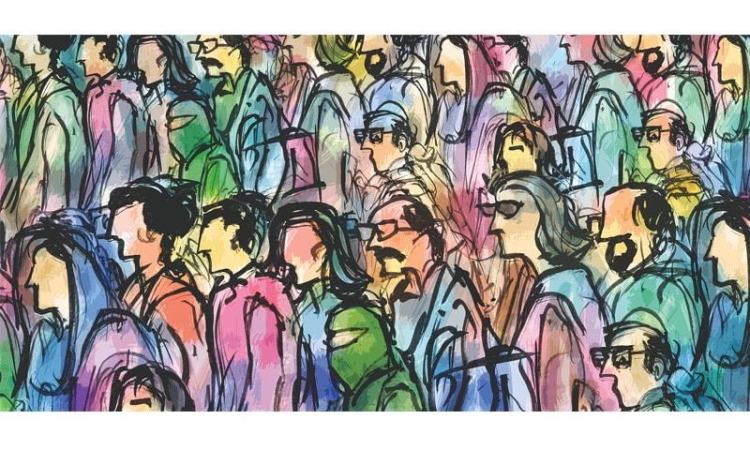
ایک زمانہ تھا جب “چلو چلو دبئی چلو!” کے نعرے نے بڑی مقبولیت پائی۔ جسے دیکھو بقچہ اٹھائے، ملک خداداد سے نالاں، قسمت سنوارنے ، زندگی بنانے دبئی، متحدہ عرب امارات اورسعودی عرب کا رخ کرتا تھا۔
وقت کا پہیہ گھوما ،زمانے نے کروٹ لی، انسانی تخیل کی پرواز نے لمبی اڑان بھری اور پاکستانیوں کی ایک بڑی تعداد امریکا، کینیڈا، آسٹریلیا، نیوزی لینڈ اور انگلینڈ، عرفِ عام میں ‘ولایت’ کا رخ کرنے لگی۔
بچپن میں ایک سہیلی تھی، تین بہنوں میں سب سے چھوٹی۔ من موہنی صورت والی۔ اس کے ابا پڑھنے ولایت گئے اور ایسے گئے کہ کبھی واپس نہ پلٹے۔ پر اب تو معاملہ ہی دوسرا ہے۔ ہجرت شوق نہیں مجبوری بن گئی ہے۔ گو دیس کے مقابلے میں پردیس میں زندگی خار زار ہے، نہ نوکریاں آسانیاں سے ملتی ہیں، نہ گھر پر نوکر چاکر کا سکھ نصیب ہوتا ہے، کیسے کیسے وہاں جا کر ایسے ویسے بن جاتے ہیں۔ غرض یہ کہ نئے سرے سے نئے ملک کے رواج کے مطابق تعلیم حاصل کرنا اور ہنر سیکھنا ہر ایک کے بس کی بات نہیں ہے۔
پڑھیے: کیا بنگلہ دیشی پاکستانیوں سے آگے نکل گئے ہیں؟
ان ترقی یافتہ ممالک میں رنگ و نسل اور عمر و ہنر کے حساب سے مقابلہ ہمہ و قت سخت اور وقت کم رہتا ہے۔ یہی معاملہ بینکار رضا اور ان کی اہلیہ کے ساتھ ہوا، جو ایک پرتعیش زندگی گزارنے کے باوجود پاکستان کے سیاسی او ر معاشرتی حالات سے نالاں ہو کر اپنے بچوں سمیت آسٹریلیا منتقل ہوگئے اور دو سال گزرنے کے باوجود اب تک نہ تو اپنے شعبے میں نوکری حاصل کر پائے، نہ وہ پر سکون زندگی جس کے خواب انہوں نے ملک میں دیکھے تھے۔ لیکن اپنی تمام تر قربانیوں اور تکالیف کو وہ اپنے بچوں کے روشن مستقبل کا صدقہ سمجھ کر بخوشی سہہ رہے ہیں۔
35 سالہ ماہر نفسیات عمارہ نے حال ہی میں کینیڈا کے راستے کھلنے پر اپنی زندگی نئے سرے سے شروع کرنے کی ٹھانی اور اس دور دراز برفیلے دیس میں جا کر بس گئیں جہاں انہیں کچھ اور ملے نہ ملے بحیثیت ایک غیر شادی شدہ خاتون، معاشرتی دباؤ اور خاندان کے بے جا طعنوں سے نجات ضرور مل گئی ہے۔
حکومت پاکستان کے جنوری 2016 میں کیے گئے حالیہ سروے کے مطابق، قریباً 7.8 ملین پاکستانی بیرون ملک مقیم ہیں جو کہ ملک کی آبادی کا اوسطاً 4 فیصد بنتا ہے۔ ان بیرون ملک پاکستانیوں میں سے ایک بڑی تعداد مشرق وسطیٰ میں رہائش پذیر ہے۔ ایک محتاط اندازے کے مطابق سال 1971 سے 2015 کے درمیان تقریباً 80 لاکھ پاکستانیوں نے قریباً پچاس کے قریب ممالک میں رخت سفرباندھا جن میں سرِفہرست سعودی عرب، متحدہ عرب عمارات، بحرین، کویت، عمان، قطر، برطانیہ، امریکا اور کینیڈا ہیں۔
نائمہ علی 40 برس کی ہیں۔ ایک ممتاز پاکستانی بینک کی اعلیٰ نوکری چھوڑ کر وہ حال ہی میں اپنے خاندان کے ساتھ امریکا جا بسیں۔ وجہ جاننے پر یوں گویا ہوئیں “امریکہ میںِ زندگی قدرے محفوظ اور بچوں کا مستقبل روشن ہے۔ ان کے پاس کام کرنے اور تعلیم کے ان گنت مواقع موجود ہیں جو کہ میری ہجرت کا اصل مقصد ہے۔”
پڑھیے: تارکینِ وطن کب تک ‘خود غرض’ کہلائیں گے
تاحال نائمہ ایک انڈین ہوٹل میں کام کر رہی ہیں اور اکثر اپنے خاندان، خصوصاً ماسی کو یاد کرکے روتی ہیں۔ تاہم ان کے نزدیک زندگی سے بڑھ کر کچھ نہیں۔ علی جو کہ نائمہ کے شوہر ہیں، ان کے لیے یہ فیصلہ نسبتاً اور بھی مشکل تھا۔ خصوصاً اس تناظر میں کہ وہ پاکستان میں ایک نجی ادارے میں آئی ٹی ہیڈ کی حیثیت سے عمدہ مراعات حاصل کر رہے تھے اور اب امریکا میں سیکورٹی گارڈ کے طور پر روزگار کمانے میں مصروف ہیں۔ عمیر کے بقول ہجرت کی کڑوی گولی اپنے ملک میں فرقہ وارانہ تعصب اور ٹارگٹ کلنگ کی کی وجہ سے نگلنی پڑی جس کا شکار ان کے اپنے بھائی اور کزن ہو چکے ہیں۔
سچ تو یہ ہے کہ کو ئی بھی شخص اپنا گھر، ملک اور خاند ان چھوڑنا نہیں چاہتا لیکن جب وطن میں رہنے کی قیمت عدم تحفظ اور ہمہ وقت خوف کی صورت میں دینی پڑے، جب اپنے ہی دیس میں آپ کو رنگ، نسل، فرقے، مذہب، مسلک اورزبان کے نام پر غیر کر دیا جائے اور مختلف مکتبہ فکر سے تعلق رکھنے کی پاداش میں آپ کو جان کے لالے پڑ جائیں تو ایسے میں اپنے پیاروں کی خاطر رخت سفر باندھنا ہی پڑتا ہے۔
اقوام متحدہ کی رپورٹ کے مطابق، پاکستان تارکین وطن کی تعداد کے اعتبار سے دنیا میں چھٹے نمبر پر ہیں۔ بیرون ملک مقیم پاکستانیوں کی بہبود سے متعلق شعبے کے 2016 کے اعداد و شمار بتاتے ہیں کہ گزشتہ ایک سال میں ملک چھوڑنے والے پاکستانیوں کی تعداد میں 20 فیصد اضافہ دیکھنے میں آیا ہے۔ سال 2015 میں تقریباً دس لاکھ پاکستانیوں نے تلاش معاش کے غرض سے ملک سے ہجرت کی ۔ ان پاکستانیوں میں ایک بڑی تعداد اعلیٰ تعلیم یافتہ، ہنرمند افراد کی تھی جنکی تعدادایک اندازہ کے مطابق سالانہ 40 سے 50 ہزار کے قریب ہے۔
پڑھیے: یورپ کی میٹھی جیل
ماہرین کا کہنا ہے کہ لوگ اکثر بہتر روزگار کے مواقع اور معاشی آسودگی کے لیے دیار غیر کی راہ اختیار کرتے ہیں اوردربدری کی صعوبتیں ایک پرسکون اور روشن مستقبل کی چاہ میں اٹھاتے ہیں۔
اس حوالے سے بحرین میں مقیم ابصار کا کہنا ہے کہ پاکستانی نو جوانوں کی ساری زندگی روٹی، کپڑا اور مکان کی تگ ودومیں گزر جاتی ہے۔ زندگی کی بنیادی ضروریات کی عدم موجودگی میں اعلٰی مقصد حیات کی کو شش خیال خام لگتا ہے۔ جبکہ بیرون ملک معمولی نوکریاں کر کے بھی فرد واحد اپنی اور اپنے اہل خانہ کی باعزت طریقے سے کفالت کر سکتا ہے۔ ان ممالک میں ایک عام آدمی کو علاج معالجے اورتعلیم کی وہ سہولیات حاصل ہیں جو ہمارے یہاں محض امرا ء کے لیے مخصوص ہیں۔
ایسے میں اپنے وطن، اپنے پاکستان میں معاشی اورمعاشرتی انصاف کے ساتھ ایک پر سکون اور آسودہ زندگی کی خواہش ہر تارک وطن کے دل میں بستی ہے اور وہ سوچتا ہے کہ کبھی تو وہ دن آئے گا جب وہ اپنے گھر پورے یقین کے ساتھ لوٹے گا۔
تادم تحریر تو یہ آس دیوانے کا خواب معلوم ہوتا ہے جس کے پورے ہونے کی مو جودہ ملکی پس منظر میں کوئی صورت نظر نہیں آتی۔



her watan chor kar janae wala wapsi ke raste khule rakh kar jata hai,, magar wapsi shazo nadir hi hoti hai.. bahar ka lifestyle wapis apne mulk main adjust hone nahi deta,, taleemyafta log merit aur opportunities ka na hone ki wajah se bahar ka rukh karte hain,,
آپ افریقہ بھول گئی ہیں یہاں یورپ سے زیادہ لوگ بستے ہیں
Bilkul baja farmaya apny jab apny dais mn app ko kabhi zaban ki aur kabhi mazhab ki bunyaad p mardia jai to eisi condition mn pardais hi acha lagta hy
yehi log hein jo watan ki badnami ka sabab bantay hain khatray to sab logon ko hein ,in ko pata nahi kia marz hay , ab pakistani wapis aarahay hein aur yeh parhay likhay befaqoof bacho k future k naam pey bahir jarahay hein pakisatn aur europe mein koi elaida khuda to nahi jo pakistan mein kuchh nahi kar saktay wo bahir kia karain gaay
السلام علیکم: اللہ ہمارے وطن کو گل وگلزار کردے تاکہ ہمارے پیارے اس کو چھوڑ کر پردیس میں دربدر نہ ہوں، آمین۔ خیرخواہ
Dear Ms. Aram, i like your blog but me khod Oman me ik achi compney me job karta ho, me 2012 me graduate howa ta, or 2015 tak menay bohot jaga per apply keya pakistan me laken koi response nai mela, har jaga per Pakistan me serf sefaresh ki zaroorat hoti hai, warna kon apna mulk chor k jata hai, apna family apna dost apni jaga, pora ka pora bachban jaha guzara ho waha sa agar koi khoshi sa jana chahta hai tu os insan ko agar bahadur kaha jai tu ghalat nai ho ga, mane yaha bohot sa log dake hai, jis k sat zeyate tu hoti hai na wo apna gar ja sakhta hai na yaha per sokoon sa hotay hai, 40 sa 50 degree me kam karta hai, or salary milna par gar baj detay hai, tu labour ko kuch be nai milta. me samjta ho k ye sare ghalti hamree khod hai ham na apna oper jo hukumran musalat keya hai tu hamara sat hona be yahe chaheya, ye kuch family hai jo sare pakistan pe hukumrani karta hai, pher be log vote de rahe hai, or na to army wale kuch kahta hai na koi Intelgence wale, sab dokay me hai pakistan me